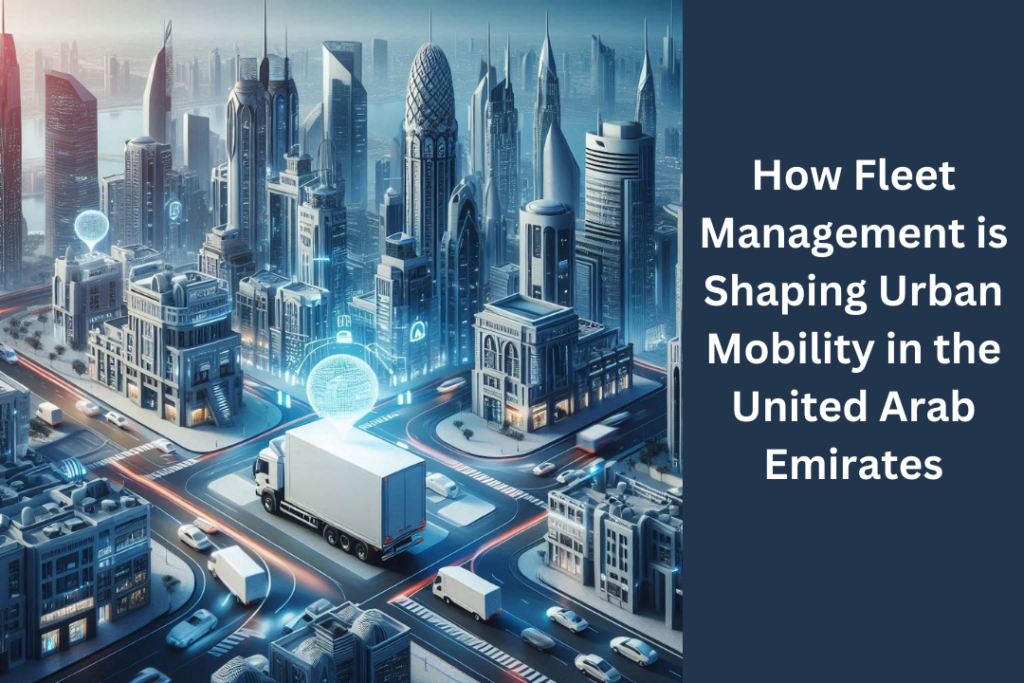
Urban mobility in the United Arab Emirates (UAE) is undergoing a transformative shift, driven by technological advancements and innovative solutions. One of the key players in this revolution is fleet management. As cities across the UAE continue to grow and evolve, the need for efficient, sustainable, and intelligent transportation systems becomes more pressing. Fleet management is emerging as a critical component in achieving these goals, offering a range of benefits that are shaping the future of urban mobility in the region.
The Role of Fleet Management in Urban Mobility
Fleet management refers to the use of advanced technology and data analytics to oversee and manage vehicle fleets. This includes everything from tracking vehicle locations to optimizing routes, monitoring driver behavior, and ensuring regular maintenance. In the context of urban mobility, fleet management plays a vital role in improving efficiency, reducing costs, and enhancing the overall transportation experience.
1. Enhancing Efficiency and Reducing Congestion
One of the primary benefits of fleet management is its ability to enhance operational efficiency. In bustling urban environments like Dubai and Abu Dhabi, traffic congestion is a significant challenge. Fleet management systems can mitigate this issue by optimizing routes and providing real-time updates to drivers. This not only reduces travel time but also minimizes fuel consumption and carbon emissions.
2. Promoting Sustainability
Sustainability is a major focus for the UAE government, particularly in light of the country’s ambitious Vision 2021 plan, which aims to create a more sustainable and diversified economy. Fleet management contributes to this goal by enabling the adoption of eco-friendly vehicles, such as electric and hybrid models. Additionally, by optimizing routes and improving vehicle maintenance, fleet management helps reduce the overall carbon footprint of urban transportation.
3. Improving Safety and Compliance
Safety is another critical aspect of urban mobility that fleet management addresses. Advanced fleet management systems include features such as driver monitoring and predictive maintenance. By tracking driver behavior, such as speed, braking patterns, and adherence to traffic rules, fleet managers can identify and address potential safety risks. Moreover, ensuring that vehicles are well-maintained and comply with local regulations is essential for preventing accidents and maintaining public safety.
4. Facilitating Data-Driven Decision Making
In the digital age, data is a powerful tool for making informed decisions. Fleet management systems generate a wealth of data that can be analyzed to identify trends, inefficiencies, and opportunities for improvement. For example, by analyzing fuel consumption data, fleet managers can make decisions that lead to cost savings and reduced environmental impact. Similarly, data on vehicle usage can inform decisions about fleet size and composition, ensuring that resources are used effectively.
The Impact of Fleet Management on Different Sectors
The influence of fleet management extends beyond urban transportation, impacting various sectors across the UAE.
1. Public Transportation
In the public transportation sector, fleet management is revolutionizing the way buses, taxis, and other forms of mass transit operate. By providing real-time tracking and route optimization, fleet management systems help reduce waiting times for passengers and improve overall service reliability. This is particularly important in cities like Dubai, where public transportation plays a crucial role in daily commutes.
2. Logistics and Delivery Services
The logistics and delivery sector is another area where fleet management is making a significant impact. With the rise of e-commerce, the demand for efficient and timely delivery services has skyrocketed. Fleet management enables companies to meet these demands by optimizing delivery routes, monitoring driver performance, and ensuring that vehicles are always in top condition. This not only improves customer satisfaction but also reduces operational costs.
3. Corporate Fleets
For businesses that rely on corporate fleets, such as rental car companies and service providers, fleet management offers numerous benefits. By tracking vehicle usage and maintenance needs, companies can extend the lifespan of their vehicles and reduce downtime. Additionally, fleet management systems can help businesses meet sustainability targets by encouraging the use of fuel-efficient vehicles and reducing unnecessary travel.
Challenges and Opportunities in Fleet Management
While fleet management offers numerous benefits, it also presents certain challenges, particularly in the context of urban mobility in the UAE.
1. Integration with Existing Infrastructure
One of the key challenges is integrating fleet management systems with existing urban infrastructure. This requires collaboration between various stakeholders, including government agencies, transportation providers, and technology companies. The UAE’s commitment to becoming a global leader in smart cities presents an opportunity to overcome these challenges and create a seamless, integrated urban mobility system.
2. Balancing Innovation with Regulation
As fleet management technology continues to evolve, there is a need to balance innovation with regulation. The UAE government has been proactive in creating a regulatory framework that supports technological advancements while ensuring safety and compliance. However, as new technologies emerge, there will be a need for ongoing collaboration between regulators and industry leaders to address potential challenges and ensure that fleet management systems continue to contribute to the overall goals of urban mobility.
3. Leveraging Emerging Technologies
Emerging technologies, such as autonomous vehicles and 5G connectivity, present exciting opportunities for fleet management. These technologies have the potential to further enhance efficiency, safety, and sustainability. For example, autonomous vehicles could reduce the need for human drivers, while 5G connectivity could enable real-time communication between vehicles and infrastructure. As these technologies become more widely adopted, fleet management systems will need to evolve to take full advantage of their potential.
FAQs: How Fleet Management is Shaping Urban Mobility in the United Arab Emirates
Q1: What is fleet management, and how does it impact urban mobility in the UAE?
Fleet management involves the use of technology and data analytics to oversee and manage vehicle fleets. In the UAE, fleet management is playing a crucial role in shaping urban mobility by enhancing efficiency, promoting sustainability, improving safety, and facilitating data-driven decision-making.
Q2: How does fleet management contribute to sustainability in urban mobility?
Fleet management contributes to sustainability by enabling the adoption of eco-friendly vehicles, optimizing routes to reduce fuel consumption, and improving vehicle maintenance to minimize carbon emissions. These efforts align with the UAE’s broader goals of creating a more sustainable transportation system.
Q3: What sectors are most impacted by fleet management in the UAE?
Fleet management significantly impacts sectors such as public transportation, logistics and delivery services, and corporate fleets. In each of these sectors, fleet management improves efficiency, reduces costs, and enhances service reliability.
Q4: What challenges does fleet management face in the UAE?
Some of the challenges include integrating fleet management systems with existing urban infrastructure, balancing innovation with regulation, and leveraging emerging technologies such as autonomous vehicles and 5G connectivity.
Q5: What are the future prospects for fleet management in the UAE?
The future of fleet management in the UAE is promising, with opportunities to further enhance urban mobility through the adoption of emerging technologies, improved regulatory frameworks, and continued collaboration between stakeholders.

